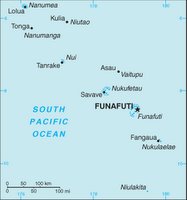 It's back to business with our regular Monday feature - Country Focus!
It's back to business with our regular Monday feature - Country Focus!Background: In 1974, ethnic differences within the British colony of the Gilbert and Ellice Islands caused the Polynesians of the Ellice Islands to vote for separation from the Micronesians of the Gilbert Islands. The following year, the Ellice Islands became the separate British colony of Tuvalu. Independence was granted in 1978. In 2000, Tuvalu negotiated a contract leasing its Internet domain name ".tv" for $50 million in royalties over the next dozen years.
Location: Oceania, island group consisting of nine coral atolls in the South Pacific Ocean, about one-half of the way from Hawaii to Australia
Population: 11,636 (July 2005 est.)
Total Area: 26 sq km - 0.1 times the size of Washington, DC
Climate: tropical; moderated by easterly trade winds (March to November); westerly gales and heavy rain (November to March)
Natural resources: fish
Environment - current issues: since there are no streams or rivers and groundwater is not potable, most water needs must be met by catchment systems with storage facilities (the Japanese Government has built one desalination plant and plans to build one other); beachhead erosion because of the use of sand for building materials; excessive clearance of forest undergrowth for use as fuel; damage to coral reefs from the spread of the Crown of Thorns starfish; Tuvalu is very concerned about global increases in greenhouse gas emissions and their effect on rising sea levels, which threaten the country's underground water table; in 2000, the government appealed to Australia and New Zealand to take in Tuvaluans if rising sea levels should make evacuation necessary.
Environment - international agreements: party to: Biodiversity, Climate Change, Climate Change-Kyoto Protocol, Desertification, Law of the Sea, Ozone Layer Protection, Ship Pollution. Signed, but not ratified: none of the selected agreements.
National holiday: Independence Day, 1 October
 Economy - brief overview: Tuvalu consists of a densely populated, scattered group of nine coral atolls with poor soil. The country has no known mineral resources and few exports. Subsistence farming and fishing are the primary economic activities. Fewer than 1,000 tourists, on average, visit Tuvalu annually. Government revenues largely come from the sale of stamps and coins and worker remittances. About 1,000 Tuvaluans work in Nauru in the phosphate mining industry. Nauru has begun repatriating Tuvaluans, however, as phosphate resources decline. Substantial income is received annually from an international trust fund established in 1987 by Australia, NZ, and the UK and supported also by Japan and South Korea. Thanks to wise investments and conservative withdrawals, this fund has grown from an initial $17 million to over $35 million in 1999. The US government is also a major revenue source for Tuvalu because of payments from a 1988 treaty on fisheries. In an effort to reduce its dependence on foreign aid, the government is pursuing public sector reforms, including privatization of some government functions and personnel cuts of up to 7%. In 1998, Tuvalu began deriving revenue from use of its area code for "900" lines and in 2000, from the lease of its ".tv" Internet domain name. Royalties from these new technology sources could increase substantially over the next decade.
Economy - brief overview: Tuvalu consists of a densely populated, scattered group of nine coral atolls with poor soil. The country has no known mineral resources and few exports. Subsistence farming and fishing are the primary economic activities. Fewer than 1,000 tourists, on average, visit Tuvalu annually. Government revenues largely come from the sale of stamps and coins and worker remittances. About 1,000 Tuvaluans work in Nauru in the phosphate mining industry. Nauru has begun repatriating Tuvaluans, however, as phosphate resources decline. Substantial income is received annually from an international trust fund established in 1987 by Australia, NZ, and the UK and supported also by Japan and South Korea. Thanks to wise investments and conservative withdrawals, this fund has grown from an initial $17 million to over $35 million in 1999. The US government is also a major revenue source for Tuvalu because of payments from a 1988 treaty on fisheries. In an effort to reduce its dependence on foreign aid, the government is pursuing public sector reforms, including privatization of some government functions and personnel cuts of up to 7%. In 1998, Tuvalu began deriving revenue from use of its area code for "900" lines and in 2000, from the lease of its ".tv" Internet domain name. Royalties from these new technology sources could increase substantially over the next decade.Budget: revenues: $22.5 million; expenditures: $11.2 million, including capital expenditures of $4.2 million (2000 est.)
Labor force: 7,000 (2001 est.)
Labor force - by occupation: people make a living mainly through exploitation of the sea, reefs, and atolls and from wages sent home by those abroad (mostly workers in the phosphate industry and sailors)
Agriculture - products: coconuts; fish
Industries: fishing, tourism, copra
Oil - production: NA
Oil - imports: NA
Oil - exports: NA
Oil - proved reserves: NA
Exports: $1 million f.o.b. (2004 est.)
Exports - partners: Germany 56.5%, Fiji 14.3%, Italy 10.9%, UK 7.7%, Poland 4.9% (2004)
Imports: $31 million c.i.f. (2004 est.)
Imports - partners: Fiji 50.2%, Japan 18.1%, Australia 9.6%, China 8%, New Zealand 5.5% (2004)
Government departments:
Tuvalu Government Website : HomePage
Media:
Tuvalu News Headlines
Travel Information:
Tuvalu Travel Information Lonely Planet Destination Guide
Tuvalu
Other useful links:
Tuvalu Islands Home Page
Guardian Unlimited Guardian daily comment Comment: Farewell Tuvalu
USATODAY.com - Tuvalu's sinking, but its domain is on solid ground
